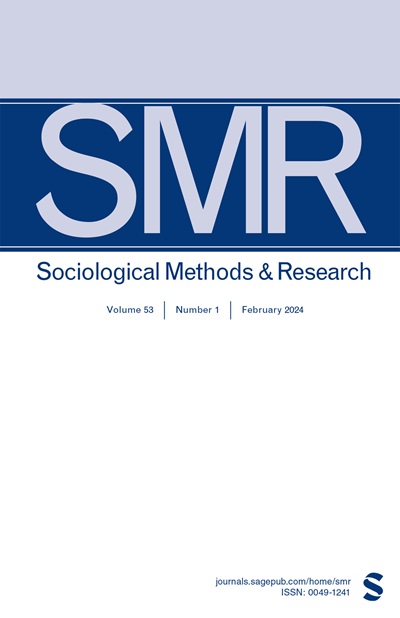随着时间的推移监测态度:真正的变化还是重复访谈的结果?
IF 6.5
2区 社会学
Q1 SOCIAL SCIENCES, MATHEMATICAL METHODS
引用次数: 0
摘要
面板数据通常用于研究社会模式的变化和稳定。然而,在小组研究中,重复访谈可能会通过触发对被调查主题的反思过程(认知刺激假说)来影响受访者的态度。利用来自德国概率和非概率小组的调查实验数据,我们调查了六次小组调查中受访者堕胎态度的变化及其潜在机制。实验控制了接受相同态度问题的频率。我们估计了多组和纵向结构方程模型,以区分堕胎态度的测量变化与“真实”态度的变化。结果表明,重复回答相同的堕胎问题增加了受访者报告态度的可靠性和他们对堕胎潜在态度的稳定性。然而,我们没有发现任何证据表明态度确定性和对堕胎的了解有所增加,只有初步证据表明由于一般调查经验,反应行为有所改善(态度可靠性增加)。本文章由计算机程序翻译,如有差异,请以英文原文为准。
Monitoring Attitudes Over Time: Real Change or the Result of Repeated Interviewing?
Panel data are often used to study change and stability in social patterns. However, repeated interviewing may affect respondents’ attitudes in a panel study by triggering reflection processes on the surveyed topics (cognitive stimulus hypothesis) . Using data from a survey experiment within a probability-based and a nonprobability panel in Germany, we investigate change—and the mechanisms underlying change—in respondents’ abortion attitudes over six panel waves. The experiment manipulated the frequency of receiving identical attitude questions. We estimate multiple-group and longitudinal structural equation models to differentiate change in the measurement of abortion attitudes from “real” attitude change. Results show that repeatedly administering the same abortion questions increases the reliability of respondents’ reported attitudes and the stability of their latent attitudes toward abortion. However, we find no evidence of an increase in attitude certainty and knowledgeability on abortion and only tentative evidence of improved response behavior (increased attitude reliability) due to general survey experience.
求助全文
通过发布文献求助,成功后即可免费获取论文全文。
去求助
来源期刊

Sociological Methods & Research
Multiple-
CiteScore
16.30
自引率
3.20%
发文量
40
期刊介绍:
Sociological Methods & Research is a quarterly journal devoted to sociology as a cumulative empirical science. The objectives of SMR are multiple, but emphasis is placed on articles that advance the understanding of the field through systematic presentations that clarify methodological problems and assist in ordering the known facts in an area. Review articles will be published, particularly those that emphasize a critical analysis of the status of the arts, but original presentations that are broadly based and provide new research will also be published. Intrinsically, SMR is viewed as substantive journal but one that is highly focused on the assessment of the scientific status of sociology. The scope is broad and flexible, and authors are invited to correspond with the editors about the appropriateness of their articles.
 求助内容:
求助内容: 应助结果提醒方式:
应助结果提醒方式:


